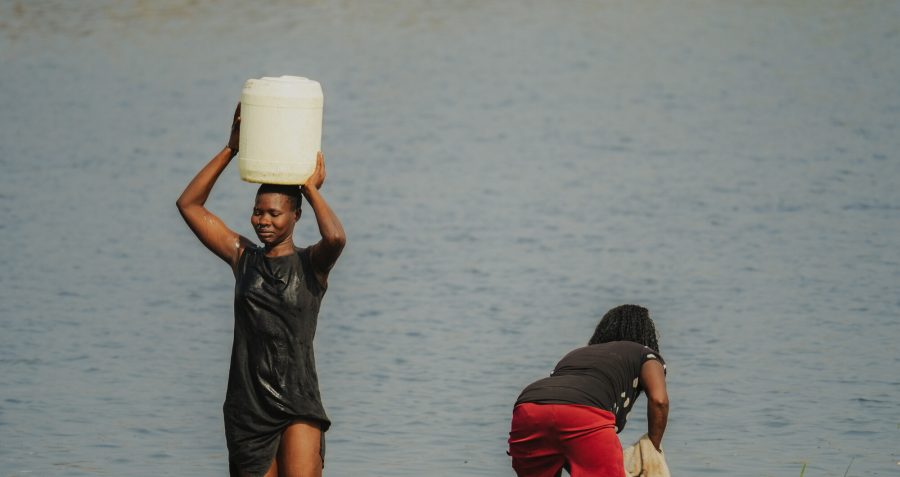Minimum Service Package for the integration of female genital schistosomiasis into sexual and reproductive health and rights interventions

A new technical guide developed by Frontline AIDS and partners aims to help health planners and programmers to integrate female genital schistosomiasis services with wider sexual and reproductive health and rights (SRHR) interventions.
Female genital schistosomiasis (FGS) impacts an estimated fifty-six million women and girls across sub-Saharan Africa. It is a condition that results from a parasitic infection and leads to significant sexual and reproductive health (SRH) complications, including increased risks of HIV transmission and cervical cancer. Despite its widespread impact, FGS often goes unrecognised within the broader context of SRH services, due to a lack of awareness and integrated care approaches. Addressing this gap, Frontline AIDS and its partners under the FGS integration project, have developed a Minimum Service Package (MSP) aimed at providing globally applicable programmatic guidance for the integration of FGS and sexual and reproductive health and rights.
Read the full peer-reviewed article in Frontiers here
Understanding FGS
FGS is a manifestation of schistosomiasis that occurs when Schistosoma haematobium parasites infect the female genital area. The infection often results in symptoms such as abnormal vaginal discharge, genital itching, and painful intercourse, which are frequently mistaken for sexually transmitted infections (STIs). This means many women and girls with FGS are often treated for and STI, given the wrong treatment and stigmatised for their assumed sexual activity. Without appropriate treatment, FGS can lead to severe complications such as infertility, miscarriage, and an increased susceptibility to HIV infection.
Diagnosis and treatment of FGS
FGS is diagnosed during pelvic exams, where doctors check for specific signs on the vaginal tissue or cervix, such as sandy or yellow patches, rubbery bumps, or unusual bleeding areas. If suspected, FGS can be easily treated with praziquantel, which can also be used as a routine preventative drug for schistosomiasis.
Preventive measures, primarily through Mass Drug Administration (MDA) programs, remain incredibly important but can miss at-risk women and girls. These programs, managed by Neglected Tropical Diseases (NTD) initiatives, are not coordinated with SRHR services. The World Health Organization advocates integrating praziquantel distribution into SRHR services in schistosomiasis-endemic areas to improve coverage.
The need for integrated services
The integration of FGS treatment and prevention into SRHR services is critical for addressing the disease effectively. Historically, efforts to combat FGS have been isolated from broader SRHR programs which has hindered the effectiveness of interventions and left many women and girls without necessary care. Our MSP aims to bridge this gap by providing a cohesive programmatic framework for health providers to integrate FGS interventions within existing SRHR services.
THE Development of the MSP
In collaboration with thirty-five geographically diverse experts from six sectors for effective FGS service integration: NTDs, FGS, SRH, HIV, water, sanitation, and hygiene (WASH), and cervical cancer; we undertook a series of virtual workshops to develop the MSP. These workshops facilitated a deep dive into the complexities of FGS and its intersections with SRHR, leading to the creation of a foundational framework for integration.
Key components of the MSP
Through the participatory process, the project team identified four service points for the integration of FGS and SRH services:
- Health literacy involves educating communities and patients at all health care levels about FGS signs and symptoms, prevention and treatment as part of broader sexual and reproductive health interventions.
- Screening and diagnosis is integrated into SRH programmes, where healthcare workers educate patients on FGS and its risks, perform risk assessments, and conduct sensitive verbal screenings and pelvic examinations to identify signs of FGS. Screening and diagnosis is completed whilst addressing mental health concerns, the possibility of gender based violence and experiences of stigma.
- Treatment and care involves the administration of praziquantel and symptom-based treatment by healthcare workers at all care levels and during MDAs, while also addressing mental health, stigma, and gender-based violence concerns.
- Social inclusion and equity involves advocacy and tackling structural barriers such as improving access to FGS services, reducing exposure to contaminated water, ensuring availability of praziquantel, and addressing gender-based violence, all under the overarching goal of social inclusion and equity across all levels of health care and community settings.
Implementation and testing of the MSP
The MSP is designed to be adaptable to various country contexts within schistosomiasis-endemic regions. The next steps involve rolling out the MSP in pilot projects across several African countries to evaluate its effectiveness and make necessary adjustments. This will now be done in three countries across Kenya, in collaboration with the Kenyan Ministry of Health. This hands-on approach will allow us to gather real-world insights into the practical application of the MSP and its impact on improving SRH outcomes for women and girls affected by FGS.
A more holistic approach toward women’s health
The integration of FGS management into SRHR interventions represents a significant stride towards a more holistic approach to women’s health in schistosomiasis-endemic regions. By recognising FGS within the spectrum of SRH care, we can significantly reduce its burden and improve the quality of life for millions of women and girls. The MSP is not just a guideline but a beacon of hope for better health outcomes, demonstrating the power of an integrated approach in tackling complex health challenges.

